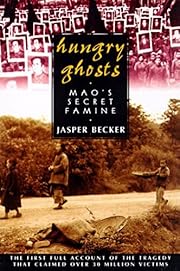

Click on a thumbnail to go to Google Books.
|
Loading... Hungry Ghosts (1996)by Jasper Becker
 None No current Talk conversations about this book. I really liked this book. It tells the story of Mao Zedong and what he did to China during his reign. Mao kept anybody outside of China in ignorance of what was happening in the horrific famine. His man-made famine is something very few people know about, even now. As my daughter said"How could something like that happen (45 million dead in 3 years) and I never learned about that in school?" This book will open your eyes. One of the most compelling history books I've ever read, period. I'm a lover of history who recognizes that 90% of the books I read make most people fall to sleep - but with 'Hungry Ghosts', I recommend it even to those who typically would never pick up a history book at all. The modern and recent scholarship of 'Hungry Ghosts' provides a perspective on Maoist China which has only recently been revealed. After reading this book, I must seriously reconsider the conventional wisdom that "Hitler was the most evil historical actor of the 20th century." But its even more than that, though: the megalomania of Mao, and the wild, collective mass-delusion of hundreds of millions of ideologically brainwashed Chinese is truly breathtaking to read about; nothing short of astonishing, even in the context of a century that was filled with many instances of insane atrocities. Read this book. Excellent Scholarship This book looks at the disastrous policies of the Chinese Communist Party and how those policies led to famine in the late '50s and early '60s. Jasper's writing, while dry and uninteresting, is an example of excellent scholarship. He used countless sources, including many internal CCP documents, interviews, and plenty of statistical analysis. Mixed with the scholarship are several in-depth narratives that look at specific counties and provinces in China. Becker's book is one of the first to detail the disastrous Great Leap Forward, Yang Jisheng's "Tombstone" and then Frank Dikötter's "Mao's Great Famine." The English translation of "Tombstone" removes about half of the original book's contents. "Mao's Great Famine" is somewhat more myopic than "Hungry Ghosts," providing little geography context for the hundreds of anecdotes Dikötter presents. The scholarly debate between these books seems focused on the number of deaths. Taken together, the three books point to a death toll between 30,000,000 and 45,000,000 - an unfathomable tragedy. All three books correctly point out the disgusting human fault of the famine. Jasper's book, while dryer, does an excellent job of examining local and national faults. no reviews | add a review
In the tradition of John Hersey's Hiroshima, journalist Jasper Becker's penetrating account of China's four-year famine uncovers the truth behind one of the darkest chapters in history. Hungry Ghosts is the horrific story of the state-sponsored terror, cannibalism, torture, and murder during Mao Zedong's "Great Leap Forward," an attempt at utopian engineering gone wrong. This is the unforgettable story of the century's greatest human rights disaster, in which more people died than in Stalin's purges and the Holocaust put together. Becker conducted hundreds of interviews and spent years immersed in painstaking detective work to examine the unprecedented madness that plagued China between 1958 and 1962. For the first time since it was so ruthlessly and categorically erased from history, Becker unearths what really happened during these years, and how the famine and terror could have been kept a secret for so long. No library descriptions found. |
Current DiscussionsNonePopular covers
 Google Books — Loading... Google Books — Loading...GenresMelvil Decimal System (DDC)363.8095109045Social sciences Social problems & social services Other social problems and services Food supply History, geographic treatment, biographyLC ClassificationRatingAverage: (4.04) (4.04)
Is this you?Become a LibraryThing Author. |
||||||||||||||||||||||||||||||||||||||||||||||||||||||||||||||||||||||||||||||||||||||||||||||||||||||||||||||||||||||||
Becker begins with an overview of famine in China and elsewhere in the world, and in particular the Soviet famine of 1930-33. He discusses the causes of the famine, it's effect on various regions and groups of people (like the Tibetans and prisoners in the labor camps), and the aftermath, which led to the Cultural Revolution. He situates it in both Chinese history and in the world and spends several chapters at the end of the book discussing how the famine was documented, how the various death toll estimates were arrived at, and how the Western press influenced policy and was influenced.
I came at the book already knowing something about the famine from the memoirs I had read, and I think Becker was writing for an audience that either didn't know it had happened or denied it had happened. His tone at times was, I don't know, strident? in making his points. He was definitely trying to convince people. All in all, however, I found the book both easy to read and yet comprehensive and well-documented. I would recommend it to anyone interested in this time period. (